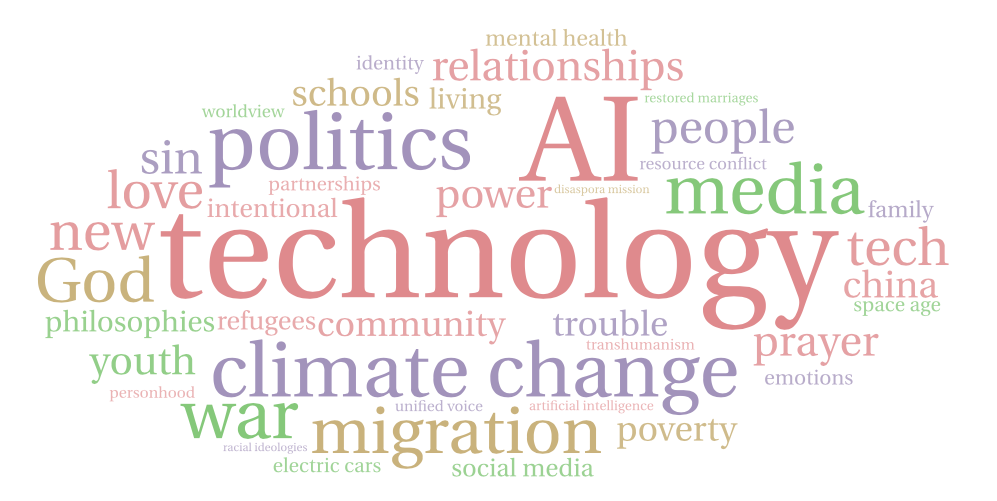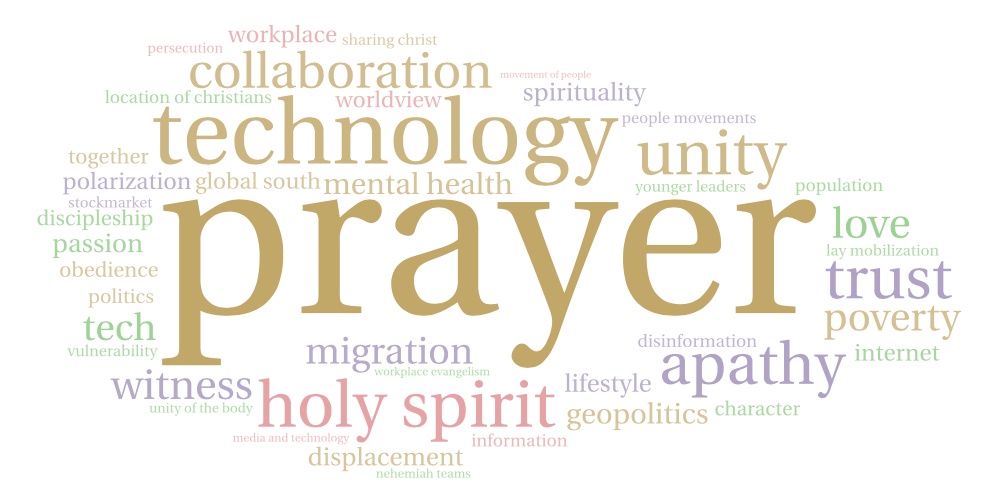Christian leaders affirm technology’s importance, but often fail to see it as a gap deserving further research.
If you ask the average missional leader what the biggest influence will be on the Great Commission by 2050, they are likely to say, ‘technology’. But if you ask, ‘What should Christians do about it today?’, their response may be, ‘Nothing’ or ‘I don’t know where to start.’
These are the findings of two separate pieces of Lausanne research from the past three years.
This past summer at a plenary session for a gathering related to Lausanne 4 called L4NY, leaders imagined together what the gospel in 2050 might look like. Researcher and professor Matthew Niermann took a digital straw poll of the audience, asking them two questions. Some 80-90 participants texted in their responses, creating a word cloud on the screen.
First, Niermann asked the audience, ‘In 1-2 words, what do you think will shape the world in 2050?’ Eighty-one people responded with about 48 different words, including ‘politics’, ‘ideology’, ‘poverty’, and ‘migration’. But standing out big and bold were two words, larger than the rest: ‘climate change’ and ‘technology’.
In 1-2 words, what do you think will shape the world in 2050?

The theme of technology appeared in other people’s responses as well: ‘social media’, ‘transhumanism’, ‘artificial intelligence’, ‘space age’, and ‘electric cars’. Clearly, most prominent in attendees’ minds was technology in some form. It would almost certainly shape the gospel in 2050.
After that, Niermann asked a second question, and responses populated a new word cloud. He asked, ‘In 1-2 words, what aspect of the world in 2050 do you think will most affect the Great Commission?’ This time 93 people weighed in.
The words included some of the same topics as before, but also new entries like ‘collaboration’, ‘population’, ‘location of Christians’, and ‘sharing Christ’. The word ‘technology’ appeared just behind more prominent words like ‘prayer’, ‘the Holy Spirit’, and ‘revival’. But again, additional tech-related terms show up too: ‘disinformation’, ‘the internet’, ‘information’, ‘tech’, and ‘media and technology’.
In 1-2 words, what aspect of the world in 2050 do you think will affect the Great Commission?

Clearly the influence of ‘technology’ stands at the forefront of leaders’ minds. They see it as a major influence in the next three decades. In fact, it already is. So what should Christians do about it?
Tech Goes Missing
Perhaps we should take these polling results with a grain of salt. After all, it was a straw poll with a small sample size and reflexive responses. Except that L4NY wasn’t an anomaly. Other research from Lausanne has highlighted similar findings. Only, these findings reveal an apparent contradiction and suggest a more problematic attitude toward tech.
Starting in 2020 and continuing for 10 months, Lausanne hosted 36 listening sessions (full report pdf). They asked evangelical leaders from around the world the same five questions. Of those, three questions can add more insight and nuance to Niermann’s L4NY poll:
Question #1:
‘What promising breakthroughs and innovations do you see that can accelerate the fulfilment of the Great Commission?’
In line with the L4NY responses, 80 percent of the listening sessions mentioned technology (29 of 36). Across numerous listening sessions, themes emerged around ‘using new technologies and media for ministries’. It’s clear that evangelical leaders from around the globe believe that technology will play a prominent part in the Great Commission.
Question #2:
‘What are the most significant gaps or remaining opportunities towards the fulfilment of the Great Commission?’
In response to this second question, a surprising result begins to emerge: technology’s prominence begins to drop off rather dramatically. Only 22 percent of the listening sessions (8 of 36) mentioned ‘Churches not using contemporary technologies and media’ as a problem. For various possible reasons, current leaders don’t seem to see ‘technology’ as a gap or missed opportunity for the Great Commission. We’ll explore more about why below, but first, one more question.
Question #3:
‘Where is further research needed?’
With this third question, the subject of technology disappears completely. In the listening sessions, none of the leaders suggested that technology needs more research. The closest to ‘technology’ that any response gets are comments about ‘Gen Z and younger generations’ or possibly ‘sociocultural context of ministry’, but for all intent and purposes, technology is nowhere to be found.
In summary, across the globe, leaders strongly believe tech will shape the world and the gospel in the next three decades. They also believe that tech promises breakthroughs and innovations for the Great Commission. But these same leaders do not often see tech as a gap, an opportunity, or a subject deserving more research.
Why is this?
ARTICLE
Global Classroom Media and Technology Episode
What does faithful discipleship look like in a world dominated by media and technology?
Why Are Leaders Overlooking Tech?
Leaders have a lot of things vying for their attention at any given time, including articles like this one. They have plenty of concerns, whether it’s the tyranny of the urgent or their passion of achieving the mission in front of them. But tech is undoubtedly involved in many of these concerns. So when it appears in some areas and not others, it’s worth better understanding why.
To help explain the discrepancy, let’s look at four possible reasons future-minded leaders might be disregarding tech.
1. They are focused on using technology.
For some leaders, tech is just a fact of life. It’s hard to imagine any other way of doing ministry. Tech runs in the background, often going unnoticed. While the digital revolution has foregrounded technology’s impact more than in past generations, leaders may believe that using it is an inevitable part of their ministry strategy. For them, the question isn’t if they should use it, but simply how. With this kind of attitude shaping their outlook, the technology they use frames which options they pay attention to, and causes them to overlook approaches that might not fit in that frame.
2. They are focused on redeeming technology.
Given the increased attention given to technology today, many leaders are considering tech more intentionally. They still want to use it, but they want to use it well. They’ve seen how people and corporations have misused tech to surveil people, manipulate them, and abuse their human dignity. As ministry leaders they want to use technology differently.
To them, tech is something that can be used for good or bad, and in their view the Great Commission is more than just a good cause. It gives technology a truly worthy purpose. This outlook means that any technology that can serve the Great Commission should be used. Unfortunately, this outlook can also fail to anticipate technology’s unintended consequences. They use technology for good, but don’t see how the technology itself might reshape their organization or the people they’re reaching with it. For this reason, redemptive ends can’t necessarily justify technological means.
3. They are focused on technology’s results more than on its consequences.
Many tech users focus on the results they can achieve without noticing the broader consequences a technology can have. Leaders may indeed be expert users of new technology. They may be able to explain how the system works, and they may deftly use it to achieve their goals. But focusing on the short-term results can cause them to overlook the long-term consequences.
Luther and Gutenberg surely didn’t anticipate how the printing press would redistribute knowledge and power, weakening the influence of the Catholic church and ushering in the Renaissance, and later the Enlightenment. But these are the kinds of long-term effects that are arguably more significant than whatever short-term goals they had for using the tech. In the same way, if today’s leaders are thinking about the Great Commission in 2050, they need to think as much about technology’s consequences as they do about its results.
ARTICLE
To the Ends of the World Wide Web
How social media and technology are growing churches in Iran, Ghana, and Vietnam
4. They are focused on advancing the Great Commission more than on understanding technology.
Some leaders may simply want to stay focused on the spiritual work of advancing the Gospel, and not get bogged down in the technical methods. They see tech as a distraction from the Great Commission, or just a necessary means to an end. They responded to Niermann’s straw poll at L4NY with words like ‘prayer’, ‘revival’, and ‘the Holy Spirit’. For these leaders, when it comes to tech, their attitude is, ‘What has Jerusalem to do with Silicon Valley?’
No one will argue that we should focus on technology over and above advancing the gospel, prayer, or listening to the Holy Spirit. But technology may be just as influential as money, if not more so, and with as frequently as Jesus taught about money, how much more should we be paying attention to how we embrace technology? It deserves our clear-eyed discernment, both for its results and for its consequences. For that reason alone, Christian leaders must reckon with how technology shapes their ministries, and how it will shape the gospel in the next three decades.
Technology Demands Wisdom
Technical systems aren’t inherently bad or wrong, but they do pose inherent risks. We already see ‘systems thinking’ emerging early in the Bible, and how God’s leaders managed those risks. When Moses becomes overwhelmed with adjudicating the Law, he begins developing a system of judges. He establishes a judicial system to handle the caseload, disburse justice, and help God’s people live in shalom with one another. Following his father-in-law Jethro’s advice, Moses selects ‘capable, honest men who fear God and hate bribes’. Without them, the system would never have been able to achieve that shalom.
In the New Testament, when the Apostles begin managing a food program to care for the widows of Jerusalem, they soon discover that they are doing a poor job. The Greek-speaking believers begin complaining, ‘saying that their widows were being discriminated against’. In response, the Apostles—believing themselves called to teach God’s word—instead select seven leaders who are ‘well respected’ and ‘full of the Spirit and wisdom’.
For today’s leaders, ‘teaching God’s word’ is no longer distinct from this kind of systems thinking. In many ways, the Great Commission has become systematized. And with it comes the same inherent risk posed by any system. For that reason alone, Christian ministries need the same kinds of leaders that Moses and the Apostles went looking for—capable, honest, God-fearing, well-respected, full of the Spirit and wisdom.
DEEP DIVE
Being Church in a Digital Age
A comprehensive paper covering online church, ethical considerations, and missional opportunities.
Today’s Christian leaders must embrace Jesus’ admonition to be as wise as serpents when it comes to tech. It cannot simply be used, redeemed, redirected into holy service, or altogether ignored. Instead, it should be regarded as a gap, an opportunity, and a subject deserving more research.
So how can leaders pursue this kind of wisdom?
- Ask good questions. Perhaps the most important question leaders can ask is not ‘What can I do with technology?’ but instead ‘What is this technology doing to me, to my organization, and to the people we serve?’ This question turns the focus around, directing our gaze toward the relationships that technology affects rather than the results that it achieves.
- Learn from the past. Leaders need to look backward and see how tech has shaped churches, ministries, institutions, and societies in the past. Today’s digital transformation isn’t unprecedented. Most of it has happened before at smaller scales. Go back and see how writing became a means of forgetting, rather than a receipt for memory. Consider how the printing press led to the Reformation, the Renaissance, and the Enlightenment. Explore why guns emerged and then disappeared in 17th-century Japan.
- Read good books. The good news is that there is an increasing number of Christians who are studying technology and writing about it. Professors like John Dyer, Douglas Estes, Felicia Wu Song, and Darrell Bock have all published deep analyses of technology. Writers like Andy Crouch, Tony Reinke, and Christina Crook have published wise book-length treatments on tech in the past few years. Meanwhile, Michael Sacasas writes regularly online and has a forthcoming book that will no doubt be worth every Christian leader’s time.
- Listen to good podcasts. If Christian podcasts are more your speed, check out my podcast Device & Virtue, as well as Breaking the Digital Spell, Winning Slowly, The FaithTech Podcast, and more. These do more than explain how to leverage technology for ministry. They explore how technology is shaping Christians and the church.
Advancing the Great Commission is about more than spreading a message. It’s about spreading a way of living. Many of today’s communications technologies advance the message of the gospel, but they inhibit the healthy relationships essential to producing rich lives and flourishing communities. The gospel spreads a way of life that is life-giving and relationship-building. It’s not just about believing gospel truths, but also about tasting the abundant life Jesus promises. That abundant life is abundant because of relationships.
Christian leaders are imagining the gospel in 2050. This long-term outlook is the kind of wisdom the church needs. It is also essential for discerning technology’s true consequences. Without this wisdom, ministries will deploy technology but may fail to plant the kind of abundant life that God desires for his people. Technology can produce charts and graphs of what’s happening today, but to see the gospel in 2050 requires leaders who look for more than what tech can reveal.
Once leaders begin to see how tech is shaping the church, they’ll begin demanding that tech accounts for itself. They will begin seeing it as a gap, an opportunity, and a subject deserving more research. And whether they are administering justice, distributing food, or spreading the gospel, tech-wise leaders will begin to see how to nurture healthy communities where faith, hope, and love can take root and flourish.
Photo Credits: Photo by Gerd Altmann




